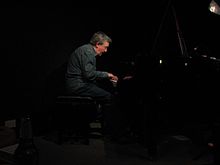Howard Riley
Howard Riley (born February 16, 1943 in Huddersfield , Yorkshire , England ) is a British pianist and composer of avant-garde , creative jazz and new improvisational music . He is one of the pioneers of free jazz in England in the late 1960s.
Live and act
Riley received piano lessons from the age of six, studied at the Universities of Wales (1961–66), Indiana (1966/67) and York (1957–70). In the mid-1960s he played in a formation of Evan Parker and John McLaughlin . From 1967 Riley worked in a trio with Barry Guy and changing drummers Jon Hiseman , Alan Jackson and then between 1971 and 1973 with Tony Oxley . In 1972 he appeared at the Donaueschinger Musiktage and the Berlin Jazz Days . In the 1970s he worked primarily as a music teacher at the Guildhall School . He gave regular solo concerts and occasionally worked with the Spontaneous Music Ensemble , the Tony Oxley Sextet and Paul Rutherford's large formation Iskra 1912 (Sequences 72 & 73). He worked in the trio around 1977 with Barry Guy and Phil Wachsmann , and again with Guy and Oxley in 1979/80. In the 1980s he repeatedly performed in a duo with the pianist Keith Tippett , but also with his American colleague Jaki Byard , as well as with the London Composers' Orchestra and with saxophonist Lol Coxhill . He was also active as a soloist and recorded the solo albums Tricect (1980), Procession (1990) and Beyond Category (1993).
In the 1990s Riley dealt with the work of Monk and Ellington (Beyond Category) and played in a trio with bassist Mario Castronari and changing drummers such as Tony Marsh or Mark Sanders (Feathers Trio), which he also expanded to include art themes as well in a quartet that he and Elton Dean headed (All the tradition). His music is often described as cool and constructivist and is strongly oriented towards avant-garde concert music.
"My development as an improviser led from time , chord changes and fixed forms in the late fifties to no time (but a much wider harmonic range) and organic forms."
Discographic notes
As a leader
- 1969 - Angle ( Columbia , 1968/69) with Barbara Thompson , Barry Guy, Alan Jackson
- 1970 - The Day Will Come (Columbia) with Guy, Jackson
- 1971 - Flight (Future Music) with Guy, Oxley
- 1973 - Synopsis (Emanem) dto.
- 1974 - Singleness (Jazzprint)
- 1975 - Overground (Emanem)
- 1984 - Live at the Royal Festival Hall ( Leo Records ) solo / with Jaki Byard
- 1990 - Procession (Wondrous) solo
- 1992 - The Heat of Moments (Wondrous)
- 1993 - Interchange (Jazzprint) with Keith Tippett
- 1995 - Wishing on the Moon (Future Music) with Mario Castronari, Tony Marsh
- 1995 - Descending Circles (Blueprint) with Elton Dean, Castronari, Mark Sanders
- 2000 - Air Play (Slam)
- 2011 - The Complete Short Stories 1998–2010 ( NoBusiness , 6 CDs)
literature
- Richard Cook , Brian Morton : The Penguin Guide to Jazz on CD . 6th edition. Penguin, London 2002, ISBN 0-14-051521-6 .
- Martin Kunzler : Jazz Lexicon . Reinbek, Rowohlt, 1988
Web links
- Short biography and detailed discography
- Review of the album Consequences by Chris May
- Howard Riley at Allmusic (English)
Notes and individual references
- ↑ The album The Day Will Come (1970) caused a sensation . Richard Cook and Brian Morton awarded this album, the product of the brief interest of the major label Columbia Records in the free English music scene, with the highest rating (four stars with a crown).
- ↑ Cook and Morton feel reminded of the encounter between Cecil Taylor and Mary Lou Williams when Riley and Byard meet ; they count the album Feathers with Jaki among the forgotten classics of British jazz. In addition to a recording of the duo from 1984, the album contains recordings of Riley's Feathers Trio from 1988. Cf. Cook / Morton p. 1245.
- ↑ There, in addition to free music, references to the bebop tradition can be seen
- ↑ M. Kunzler, p. 980.
| personal data | |
|---|---|
| SURNAME | Riley, Howard |
| BRIEF DESCRIPTION | British jazz pianist |
| DATE OF BIRTH | February 16, 1943 |
| PLACE OF BIRTH | Huddersfield , Yorkshire |
